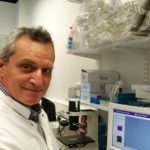Lien vers Pubmed [PMID] – 21685203
Hum. Mol. Genet. 2011 Sep;20(18):3653-66
By providing access to affected neurons, human induced pluripotent stem cells (iPSc) offer a unique opportunity to model human neurodegenerative diseases. We generated human iPSc from the skin fibroblasts of children with mucopolysaccharidosis type IIIB. In this fatal lysosomal storage disease, defective α-N-acetylglucosaminidase interrupts the degradation of heparan sulfate (HS) proteoglycans and induces cell disorders predominating in the central nervous system, causing relentless progression toward severe mental retardation. Partially digested proteoglycans, which affect fibroblast growth factor signaling, accumulated in patient cells. They impaired isolation of emerging iPSc unless exogenous supply of the missing enzyme cleared storage and restored cell proliferation. After several passages, patient iPSc starved of an exogenous enzyme continued to proliferate in the presence of fibroblast growth factor despite HS accumulation. Survival and neural differentiation of patient iPSc were comparable with unaffected controls. Whereas cell pathology was modest in floating neurosphere cultures, undifferentiated patient iPSc and their neuronal progeny expressed cell disorders consisting of storage vesicles and severe disorganization of Golgi ribbons associated with modified expression of the Golgi matrix protein GM130. Gene expression profiling in neural stem cells pointed to alterations of extracellular matrix constituents and cell-matrix interactions, whereas genes associated with lysosome or Golgi apparatus functions were downregulated. Taken together, these results suggest defective responses of patient undifferentiated stem cells and neurons to environmental cues, which possibly affect Golgi organization, cell migration and neuritogenesis. This could have potential consequences on post-natal neurological development, once HS proteoglycan accumulation becomes prominent in the affected child brain.


